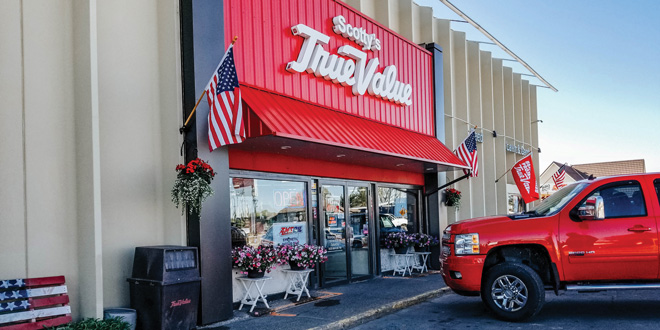There are numerous niche categories to invest in to differentiate your business or fill a need in your community. Automotive is one such category that can bring your operation closer to being a one-stop shop and enhance your ability to contend with competitors. With a well-thought-out plan of action and accurate knowledge of your customer base, automotive can be a crucial addition to any hardware store and lead to increased sales.
Keith Scott opened his first storefront, a service station, in 1950 in Rigby, Idaho. In 1981, he opened his first auto parts store. Prior to the store opening, he drove a truck around town with spare automotive parts, which inspired the launch of the auto parts store. In 1995, he purchased a True Value hardware store and moved the auto parts to the new location. He partnered with Carquest, an American automotive parts distribution network, in 2000.
Scotty’s Carquest and True Value Hardware in Rigby, Idaho, now boasts a 20,000-square-foot store and has almost tripled its yearly automotive sales over the last three years. Hardware Retailing spoke to general manager Dan Housel, who has been with the business for 12 years, and Crystal Lees, a manager who has been with the business for 14 years, about the benefits of an automotive category and what it takes to make it successful.
Thriving on Competition
Competition can encourage focus and differentiation or hold a store back; Scotty’s owner Kirk Scott leans more to the former, Lees says.
“Kirk absolutely loves competition. He welcomes it,” she says. “It keeps people honest and prices low.”
Scotty’s competes with three other national brand auto parts stores in town, and there are a total of seven competitors to Scotty’s in the small, two-stoplight town of 4,000 residents.
“We pull customers from at least a 20-mile radius,” Housel says. “We pull from even farther in some directions.”
With an array of customers from body shops and DIYers to farmers and car restorers, like many independent retailers, customer service sets Scotty’s apart from its competitors.
“People come in because of our customer service,” Lees says. “Being a small farm community, face-to-face service is still everyone’s priority over here. It’s just how people still do business.”
Scotty’s staff exceeds customer service expectations with their product knowledge and problem-solving ability.
“In the rare case that our staff doesn’t know how to help a customer, we tell our employees that there is no shame in Googling to find a solution right then and there,” Lees says. “We want to help them one way or another and for the solution to be accurate and timely.”
If an employee can’t fix a customer’s problem at the store, they make an effort to send the customer to another local business, Housel says. This strategy supports the community and curates trust and loyalty with residents.
“If we don’t have what our customers need, we give them advice and send them in the right direction,” Housel says. “That way, the next time they need something, they remember our service and come back to us.”
Long-term and experienced employees also set Scotty’s apart from its competitors. According to Housel, their staff has over 55 combined years of knowledge and experience in the automotive industry.
“Our staff in the automotive category all have backgrounds in farming and mechanical work,” Housel says. “So if a customer comes in trying to restore a 1950s pickup, our employees have the correct knowledge and experience. They know what will and will not work.”
The combined Carquest and hardware store also helps Scotty’s with the competition in the area.
“Our customers can buy everything they need in one stop,” Lees says. “They don’t have to go to several stores.”
Furthermore, Scotty’s is located on a major intersection in town and boasts a large readerboard on the corner, grabbing the attention of any potential customers.
“Everyone sits there and watches all the pictures and reads it,” Lees says. “Honestly, that’s been a big draw for us.”
Stocking for Success
As much as customer service and employee knowledge are key to a successful automotive category, elite merchandising also makes a significant impact. Scotty’s staff prioritizes stocking quality products over a large number of products.
“We focus on having quality over quantity,” Lees says. “We strive to have the finest products with excellent backed warranties.”
Carquest assists Scotty’s in stocking products.
“Our automotive supplier definitely keeps us current,” Lees says. “They help us stay stocked with new parts that are currently being used in automotive, but they also help us carry that selection of older products for restoration projects.”
Part of that quality product selection is also derived from making an effort to stay current with the automotive industry and paying attention as new products come out on the market.
“We have a few staff members who do a lot of research in their free time,” Housel says. “They look at upcoming trends and where we need to be, and they convey that information to our automotive distributor representative.”
The focus on quality remains though, especially on the salesfloor.
Scotty’s has over 400 linear shopping feet for customers in its automotive section, Lees says, who says that’s another element that sets Scotty’s apart from competitors. It also creates a space for customers to easily browse the first-rate products that Scotty’s has available.
“All of our extra parts and overstock are in an upstairs storage area, so they don’t take up our floor space,” Lees says. “We have a 36-foot belt that helps move merchandise to and from the storage space and an overhead door that allows a forklift to place freight directly into the space.”
If the products on the floor and in the upstairs location still don’t meet all of the customers’ needs, there is a Carquest warehouse close by. As a result, the store can receive products within a day, says Housel.
The automotive staff also spends time setting up displays on its salesfoor, promoting discounted items and suggesting add-on products.
“Our employees are skilled at setting up displays that are full and impactful,” Lees says. “They pair toy tractors, bales of straw and other merchandise that we have in the store with products that are on sale. It really increases our add-on sales.”
Building Benefits
The consistent need for automotive products results in perpetual and substantial sales.
“Vehicles will always get dirty and need to be cleaned,” Lees says. “And there will always be vehicles that require repair. It’s a source of income that never stops.”
The cyclical nature of the category is not the only benefit.
“The margin in this category also makes it a compelling addition,” Lees says. “With 10 to 60 percent margins, you really can’t go wrong.”
Automotive also interacts well with other categories, including one that is essential to the rural community of Rigby.
“The automotive department has allowed us to really grow our agricultural category,” Lees says. “Having both categories allows us to assist our customers with their farming equipment and become a part of their operation, which helps us build ties with the community.”
Those ties with the community and the combination of automotive alongside core hardlines categories have brought great success to Scotty’s; it is the No. 1 battery selling location within 200 miles, has tripled its automotive sales growth in recent years and received The Business of the Year award by The Rigby Chamber of Commerce in 2021.
“The automotive category really pairs well with a hardware store,” Lees says. “Tools and hardware go hand in hand with auto parts. Even the most basic automotive assortment can create an increase in store sales. It’s definitely a category worth exploring.”
Speed Through Expansion
Discover best practices when adding a new product category here.
 Hardware Retailing The Industry's Source for Insights and Information
Hardware Retailing The Industry's Source for Insights and Information








